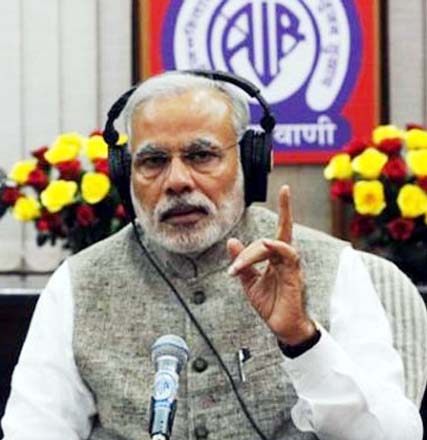
AP, New Delhi :
Prime Minister Narendra Modi made the biggest public push for a ‘cashless economy’ on his monthly ‘Mann ki Baat’ radio address+ . He acknowledged that while a ‘cashless’ society is not immediately possible, and appealed to the people to work towards it by being part of a ‘less-cash’ society immediately.
“Learn how this digital economy works. Learn the different ways you can use your bank accounts and internet banking. Learn how to effectively use the apps of various banks on your phones. Learn how to run your business without cash,” said PM Modi.
“Learn about card payments and other electronic modes of payment. Look at the malls and see how they functioning. A cashless economy is secure, it is clean. You have a leadership role to play in taking India towards an increasingly digital economy,” he added.
Addressing the role the youth have in the transition to a ‘cashless society’, he said, “Your father or mother or elder brother at home may not know about these things. But you know how to book train tickets online, you know how to buy things online. You can tell not just your family members, but also small businesses the benefits of digital payments.”
“You can teach your folks at home. Not just that, you could teach five neighbours a day.
Prime Minister Narendra Modi made the biggest public push for a ‘cashless economy’ on his monthly ‘Mann ki Baat’ radio address+ . He acknowledged that while a ‘cashless’ society is not immediately possible, and appealed to the people to work towards it by being part of a ‘less-cash’ society immediately.
“Learn how this digital economy works. Learn the different ways you can use your bank accounts and internet banking. Learn how to effectively use the apps of various banks on your phones. Learn how to run your business without cash,” said PM Modi.
“Learn about card payments and other electronic modes of payment. Look at the malls and see how they functioning. A cashless economy is secure, it is clean. You have a leadership role to play in taking India towards an increasingly digital economy,” he added.
Addressing the role the youth have in the transition to a ‘cashless society’, he said, “Your father or mother or elder brother at home may not know about these things. But you know how to book train tickets online, you know how to buy things online. You can tell not just your family members, but also small businesses the benefits of digital payments.”
“You can teach your folks at home. Not just that, you could teach five neighbours a day.

